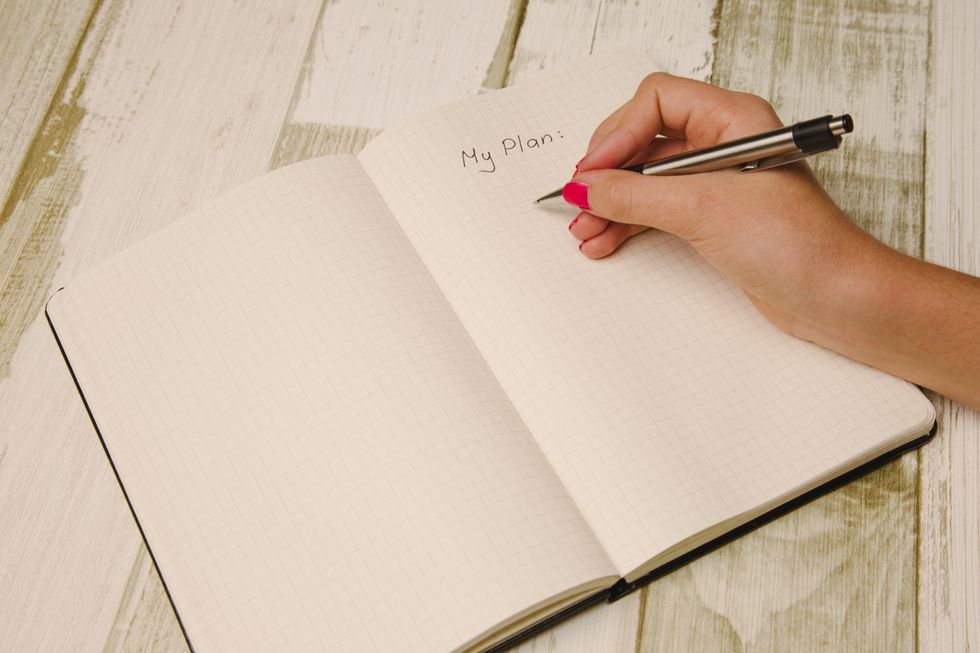Making a daily, weekly, monthly, and yearly planner has single-handedly saved my life. With everything that I have going on between balancing work, school, and a social life, it’s hard to remember everything that I have to do, or have planned to do.
I know that it sounds like a lot to keep up with, but when you’re reminded daily of the things you want to accomplish, you seem to make a lot more progress. Here is how you can be more productive in 2018, and ways to make an effective planner so you can stay on top of your game.
1. Daily Planner
Making an itinerary for your day is never a bad idea. When you have a busy life, it’s hard to keep track of the little things, and even the big things that you have to do. Of course you don’t have to write down every small detail of your daily routine, but things like: working out, calling your parents, or remembering that you have dinner plans with your friends are important things that can sometimes slip your mind when your constantly worrying about the assignments you have due, or the time that you have to go into work.
My daily planner looks something like this:
7:00 a.m. - Wake up
8:00 a.m.- Class
9:25-10:55 a.m. - BREAK (finish other work)
11:00 a.m.- Meeting
2:00 p.m. - Work
8:00 p.m. - Run 2 miles
10:00 p.m. - Read / Study
11:00 p.m. - Bed
Your daily planner reminds you of things that you should do throughout the day that you might otherwise forget about: when to be at your meeting, that you have a short break to get some of your work done, and that you should run 2 miles and be in bed by 11:00 P.m.. These small tasks and reminders help you to accomplish your weekly, monthly, and yearly goals.
2. Weekly Planner
Your daily goals should leak into your weekly planner. What things are you trying to accomplish that week, and how will these things help you to ultimately reach your monthly, and yearly goals? Your weekly planner is a reflection of your daily progress. Let’s not forget that what you do every day has a big impact on your overall success.
Your weekly planner doesn’t have to be a breakdown of what you have to accomplish each day throughout the week, but just an overall goal that you want to hit. Obviously sometimes life is going to throw speed bumps in your way, but having a weekly planner helps you to adjust your schedule so you can meet these goals in the end.
My weekly planner often looks something like this:
Week 1/1-1/7:
- Exercise:
- Run 20 miles (work out at least 30 minutes 6/7 days)
- Internship:
- Revise cover letter for (x)
- Friends/Family
- Get together with family (at least 1/7)
- Call friends to see how they are (at least 1/7)
- Personal
- Read chapters 5-7 and outline
- Finances
- Put $50 into savings
- Pay credit card payment
- Cut out Starbucks until (x) is paid for
- Assignments:
- Article submission Wed @ 5:00 P.m.
- Political theory paper Fri @ 11:59 P.m.
Looking at my weekly goals often reminds me of how important it is to keep up with my daily itinerary. If I’m pressed for time, the last thing that I want to do is have to cram everything in last minute.
3. Monthly Planner
Your monthly goal is one of the most important. The breakdown of your monthly goals is often what determines the direction your year is going in. Are you making progress on that project you’ve been working on? Is your book almost ready for publishing? There are only 12 months in the year, and it’s important to use them wisely if you’ve set big aspirations for yourself. Your monthly goal is often your cumulative report of how your previous weeks played out.
You’d be surprised at how much you’ve accomplished throughout the month. Especially when you start working towards your goals instead of just thinking about them. Things that used to take you two months to do are now only taking you four days, and your life is moving at a much faster pace because you’re not sitting idle anymore.
My monthly planners normally look something like this:
January 2018:
- School
- Maintain GPA above 3.5
- Attend 5 events
- Work
- Bonus (x) amount of $
- Finances
- Save (x) amount of $
- Pay (x) amount down of credit card
- Pay (x) for medical bill
- Pay (x) for school loans
- Family
- Go out to dinner / go have coffee with them
Yearly Planner
If you’re trying to avoid taking another L in 2018, I recommend that you follow a planner throughout your year. The worst feeling is being knee-deep into July and realizing that you haven’t accomplished a single thing that you promised yourself you would in the new year. When someone asks you what your goals are in life, remember that your years consist of efforts that work towards your ultimate end goal. If you waste years of your life just sitting around thinking about what it is that you want, you may never get there. Make sure that you put your thoughts into action, and set yearly goals for yourself that make your end goal seem for attainable. You can do it.









































